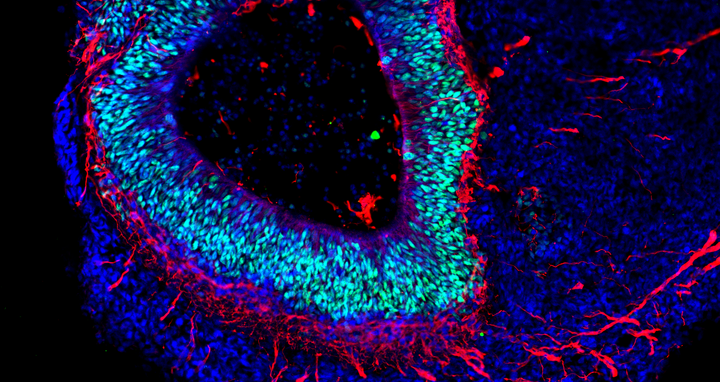Einstein Center for alternative methods in biomedicine
In the preparatory phase, the set up of infrastructure and research netting are being funded. 522,000 euros will be made available for the preliminary stage. In total, the state of Berlin is providing the Einstein Foundation in 2020/21 with 1.35 million euros for the new Einstein Center. After a renewed assessment of the overall concept by the scientific commission of the Einstein Foundation, the center could begin its work in full in 2021.
The foundation of an "Einstein Center 3R" (3R: Replace, Reduce, Refine) was initiated by Charité-Universitätsmedizin Berlin, the Freie Universität Berlin (FU), the Humboldt-Universität zu Berlin (HU) and the Technische Universität Berlin (TU); it is being developed in close cooperation with the Berlin Institute of Health (BIH), the Max Delbrück Center for Molecular Medicine in the Helmholtz Association (MDC), the Federal Institute for Risk Assessment (BfR) and the Robert Koch Institute (RKI). The center aims to create a long-term research network in Berlin, in which tissue models can be researched and innovative projects can be developed. Furthermore, universities shall gain an awareness for the topic especially while training graduate reseachers as well as communicating with the public.
“An obligation to reduce animal testing to a minimum”
"Given the particular importance of animal testing in biomedical research, it is an even greater obligation to reduce them to a minimum, to carry out animal experiments in the highest possible quality or – where possible – to replace them," says Professor Günter Stock, the CEO of the Einstein Foundation on the occasion of the funding decision.
Berlin State Secretary for Science and Research, Steffen Krach, explains: “Berlin is the center for biomedical research throughout Germany. This goes hand in hand with our aspiration to research alternative methods to animal testing in order to strengthen animal protection and reduce animal testing in research. As a state, we support the important step of bundling activities in Berlin's scientific institutions in a new Einstein Center. With our broad Berlin research network, we play a pioneering role in this area.”
Apply 3R principle rigorously
The 3R principle as developed by William Russell and Rex Burch aims at replacing animal experiments or refining animal experiments so as to reduce the numbers to a minimum. For this purpose, experimental methods such as 3D models of tissue cultures, but also an expanded quality management are used in the new 3R center. The main concern of the Einstein Center is to advance the development of therapy methods for human diseases, to improve the transferability of laboratory knowledge to the patient and at the same time to strengthen animal welfare. In the planned center, young scientists should be able to apply the 3R principle rigorously through training, instruction and betterment. Also, science communication and dialogue with the public will be key factors of the mission of the new center.
“We have been promoting Charité3R very vigorously in the development of alternative methods since 2018 and are working intensively to make those animal experiments that are irreplaceable for research on therapies more gentle. The new Einstein Center creates a cross-institutional structure in Berlin that also drives the implementation of the 3R principle on an international level,” says the Dean of Charité and Interim CEO of BIH, Professor Axel Radlach Pries.
Further information
- Website of the Einstein Stiftung
- Website Charité 3R
- MDC research on organoids
- Alternative methods at the MDC
- Research, animal experiments and the 3Rs at the MDC
Contacts
Christian T. Martin
Communications
Einstein Stiftung
+49 (0)30 20370 248
cm@einsteinfoundation.de
Dr. Corinna Pelz
Einstein Center 3R (EC3R)
Campus Charité Mitte
+49 30 450 580 188
corinna.pelz@charite.de
Jutta Kramm
Head of the Communications Department
Max Delbrück Center for Molecular Medicine in the Helmholtz Association (MDC)
+49 (0)30 9406 40
jutta.kramm@mdc-berlin.de or presse@mdc-berlin.de
- The Max Delbrück Center for Molecular Medicine (MDC)
-
The Max Delbrück Center for Molecular Medicine in the Helmholtz Association (MDC) is one of the world’s leading biomedical research institutions. Max Delbrück, a Berlin native, was a Nobel laureate and one of the founders of molecular biology. At the MDC’s locations in Berlin-Buch and Mitte, researchers from some 60 countries analyze the human system – investigating the biological foundations of life from its most elementary building blocks to systems-wide mechanisms. By understanding what regulates or disrupts the dynamic equilibrium in a cell, an organ, or the entire body, we can prevent diseases, diagnose them earlier, and stop their progression with tailored therapies. Patients should benefit as soon as possible from basic research discoveries. The MDC therefore supports spin-off creation and participates in collaborative networks. It works in close partnership with Charité – Universitätsmedizin Berlin in the jointly run Experimental and Clinical Research Center (ECRC), the Berlin Institute of Health (BIH) at Charité, and the German Center for Cardiovascular Research (DZHK). Founded in 1992, the MDC today employs 1,600 people and is funded 90 percent by the German federal government and 10 percent by the State of Berlin.





